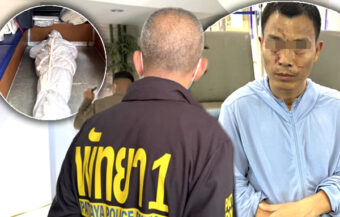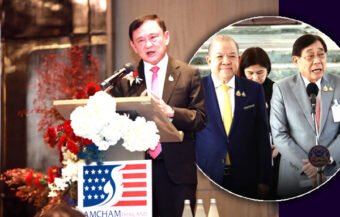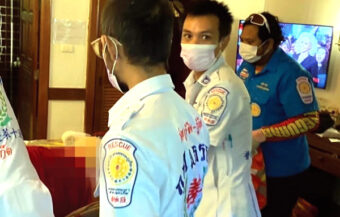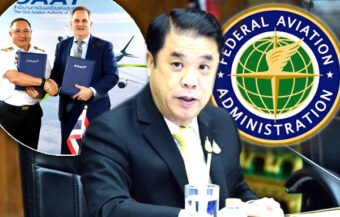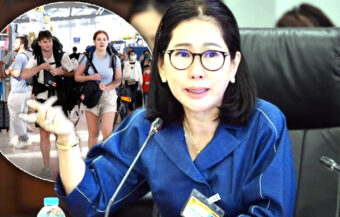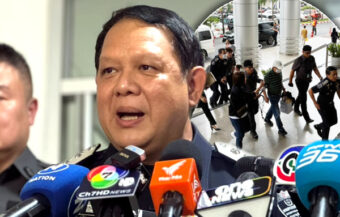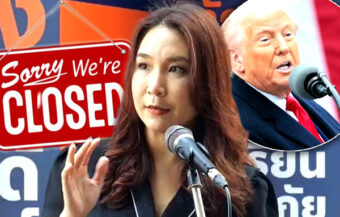It would not put a smile on your face: Thai restaurant owner, 66-year-old Jamlong Ninlakorn, faced a staggering ฿250,000 bill for a 4-day flu hospitalisation. The amount dropped to ฿150,000 only after revealing her Thai nationality and navigating the complex medical pricing structure in the Land of Smiles.
66-year-old Thai national, Jamlong Ninlakorn, a successful businesswoman who has lived in both the United States and Sweden, this week managed to have a staggering ฿250,000 bill for a 4-day hospital stay as she battled a bout of influenza, knocked down to ฿150,000 but only after she revealed that she was a Thai national. The story again brings home the problem for foreigners in Thailand with a three-tiered pricing structure in hospitals approved by the Ministry of Public Health, which can strike foreigners hard just when they are most vulnerable. Amid discussions on Wednesday as Ms Jamlong challenged the bill with the hospital, government agencies and media reporters, she revealed that she had borrowed money from friends to pay it.
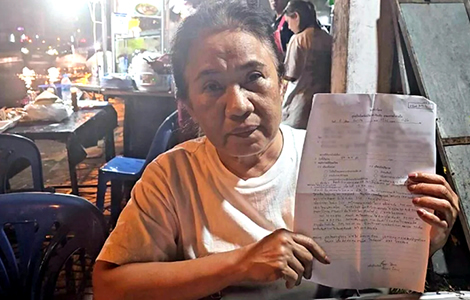
In another case in Thailand linked with the country’s controversial tiered pricing practices for foreigners and tourists, a prominent hospital in the Pak Kret area of Nonthaburi province, near Bangkok, found itself in hot water as a Thai woman, living in Sweden and visiting the country, erroneously perceived as a foreigner, confronted the institution over a jaw-dropping ฿250,000 bill for a brief four-day stint battling influenza.
Jamlong Ninlakorn’s plight highlights the worst fears of foreigners in Thailand, be they expats or visiting tourists.
66-year-old Thai woman who has made her way around the world in business blindsided by shocking bill after a few days in hospital for the flu
Miss Jamlong Ninlakorn, a 66-year-old Thai restaurant owner from Sweden, raised a storm of complaints after discovering miscellaneous medical expenses totalling ฿249,704 on her invoice.
Her perplexity deepened as she swiped a foreign credit card for payment, leaving her stunned at the sky-high medical charge.
Jamlong expressed her disbelief, questioning why a hospital in Thailand would embarrass sick foreign patients with such exorbitant fees.
The Thai national, like many women and men from the Kingdom over the last few decades, has lived in both the United States and Sweden and is used to paying her way.
On Wednesday, she insisted the bill she received from the Thai hospital was, by far, more excessive than anything she has experienced in the two Western countries where she has previously established successful restaurant business concerns.
Hospital and medical care for foreigners including tourists who spend money and expats or residents who invest must be looked at eventually
Concern about the cost of health care for visiting foreigners is a rising issue that must be tackled by the current government.
Significantly, Thailand’s foreign tourism industry found itself embarrassed also in recent weeks when the plight of a seriously sick British tourist, Dean Penson from Southend-on-Sea came to light.
The seriously ill Briton, thought to be suffering from a blood condition or possibly Leukemia, became ill days into his holiday in Phuket last month with his UK pals.
Subsequently, he had to turn to those friends and others on social media to fund a whopping £10,000 bill for emergency treatment at the Vachira Phuket Hospital, the main public hospital on the holiday island.
Another black eye for Thai tourism with sick UK man’s ‘horrific’ plight in Phuket exposed on world’s media
That story came after successive Thai governments stalled the introduction of a tourism levy to provide for automatic health insurance coverage of up to ฿500,000 per visiting tourist.
There is also rising concern about healthcare costs for retirees in Thailand although changes in insurance regulations allowing foreign insurance companies to compete have been made in recent years, creating a more competitive market.
After two days of negotiations, even after the hospital admitted its mistake in not treating her as a Thai national, the bill was reduced to ฿150,000
At this time, just days ago on Tuesday, December 5, 2023, news reporters received complaints and briefings on the elderly Thai woman’s plight urging fairness in light of Ms Jamlong’s already paid bill from the hospital in the Pak Kret area of Nonthaburi province.
Ms Jamlong and her family thought a refund was in order.
Visiting Kritsada Nakhon Village in Pak Kret District on December 6, 2023, reporters began to look into the controversially inflated hospital bill which involved one stay in an emergency ward and two nights in a shared ward.
Auntie Jamlong, as she is affectionately known, revealed that the hospital had already initiated contact with her regarding her complaint about the bill.
The negotiation process unfolded with the hospital initially offering a discount of ฿75,000.
Still unsatisfied, Jamlong called for a repayment of ฿100,000, emphasising that the initial credit card payment was made with borrowed money, urgently requested from close friends which she must still repay.
Afterwards, the proud Thai woman disclosed she had been faced with no alternative after receiving the shockingly high bill for her medical expenses after a bout of flu.
The hospital explained that the error stemmed from Jamlong initially submitting a foreign passport. They clarified that medical treatment fees were not intended to match those charged to non-Thai citizens.
Some satisfaction for elderly Thai woman who thanked the media for highlighting her case enabling her to get some fair play after being overcharged
The acknowledgement of the mistake, however, brought some sense of satisfaction to Jamlong, who expressed her thanks to the media whose swift coverage prompted various government agencies to sit up and take notice.
The Thai woman only queried the bill at all after being urged by younger members of her family.
She stressed that her attitude was always to pay her bills and that she would not have queried the charge if she thought it was reasonable. She had paid medical bills before in the United States and Sweden.
Jamlong, who never sought free treatment even though Thailand is her home country, emphasised the importance of accurate and appropriate billing.
She urged hospitals to transparently calculate reasonable treatment fees for both Thai and foreign patients, emphasising the financial challenges faced by those working abroad.
Growing and substantive issue for Thailand’s tourism industry and its growing expat population of retirees and foreigners moving to live in Thailand
Jamlong’s case mirrors a broader issue in Thailand’s healthcare system, where tiered pricing based on citizenship and visa status is a longstanding concern.
This tiered pricing system has drawn criticism for creating disparities in medical costs, something that becomes particularly acute when the patient is seriously ill with a chronic or even terminal condition.
As more and more foreigners make Thailand their second home or permanent residence, the issue is a painfully real one for thousands of foreigners currently in the country.
At length, an official Thai Ministry of Public Health policy regulates hospital charges, both public and private, allowing a three-tier pricing system. It puts Thai nationals at the top, followed by resident foreigners and then foreign tourists.
In Jamlong’s situation, the hospital mistakenly charged her 30% more, assuming she was a foreigner due to the submission of a foreign passport instead of her Thai identification card.
This led to an additional charge of ฿100,000, sparking a dispute over the hospital’s failure to verify her information.
Dutchman Edwin Buse has led the campaign in Thailand for fair play and equal treatment in hospitals for foreign patients but courts have rejected it
The striking and noteworthy case of a Dutch national, Edwin Buse, adds another layer to the ongoing controversy with his legal battles against tiered healthcare costs in Thailand. He argues that it is a matter of fair play and human rights.
Buse’s case was rejected by the Phetchaburi Administrative Court in 2021. He sought to challenge the tiered pricing system but the court argued that Thailand, as a developing country, could not afford universal health coverage.
The court’s decision affirmed tiered pricing as not constituting a breach of the constitution, citing the relative wealth of foreign residents.
Despite Buse’s determination to appeal, the broader imposition of mandatory health insurance across visa types and the application of consumer protection laws to the hospital network may not guarantee the universal pricing structure he calls for.
Three-tiered system means 50% extra is charged to tourists or foreigners in Thailand who are not resident in the Kingdom as official government policy
Thai public hospitals, under the Ministry of Public Health, now assiduously follow this three-tiered pricing system for medical services, aiming for a clearer and more predictable fee structure.
The fees mean foreigners who are not resident in Thailand pay at least 50% and up to 100% more than Thai nationals.
First, Tier 1 – Thais and neighbouring country’s citizens: This tier is specific for Thai citizens and those from neighbouring countries, paying relatively the same for medical procedures.
Second, Tier 2 – Expats: Designed for expatriates residing in Thailand, this tier applies to foreigners living and working in the country, fulfilling tax obligations and holding appropriate visas.
Third, Tier 3 – Retirees and tourists: Representing the highest fees, this tier applies to retirees and tourists visiting the country for leisure purposes.
Reports indicate specific costs for medical procedures based on the institutionalised tiered system.
For instance, a spinal MRI examination costs ฿18,700 for Tier 1, increasing to ฿23,375 for Tier 2 working and tax-paying expats and further to ฿28,050 for Tier 3 retirees and tourists.
An HIV test, which costs ฿160 for Thai nationals, rises to ฿240 for working expatriates and doubles to ฿320 for retirees and tourists.
Government challenged on this but it is working in a developing economy which faces an acute ageing crisis which will severely test limited resources
The implementation of this policy, making the tiered pricing legal and official, has sparked sensitivity among Thailand’s expat community.
However, Thai officials argue that the current regulations are at least a step in the right direction aiming for standardisation and better regulations across the country’s public and private health system.
As Thailand grapples with the challenges of balancing healthcare accessibility for its nationals and sustainability in a country with a struggling economy and facing increased pressure with a fast ageing population, the tiered pricing debate continues.
Thailand’s days of GDP growth in excess of 5% may be a thing of the past as it has grown too old
Undeniably, the situation leaves both foreign residents and tourists navigating a complex landscape of medical costs if they have the misfortune of being treated in a Thai hospital without medical insurance.
The future may bring changes, but for now, the disparities persist, shaping the healthcare experiences of those from other countries seeking treatment in the Land of Smiles.
Join the Thai News forum, follow Thai Examiner on Facebook here
Receive all our stories as they come out on Telegram here
Follow Thai Examiner here
Further reading:
Dutchman’s tenacious fight over tiered healthcare costs firmly rejected by a Thai provincial court
50-year-old Dutchman suffering from cancer files complaint against Hua Hin hospital over fees
Thai Ministry of Health brings in tiered pricing for medical services to foreigners and tourists
Battlefield friends help UK man and wife escape medical bill of £12k in Thailand. Now safely home
New health coverage proposals for foreigners in Thailand a concern for those with medical conditions
UK man stranded in Thailand facing a £100,000 medical bill may be rescued by crowd funding success
Thai government’s new compulsory insurance may only apply to retirement visas for foreigners



